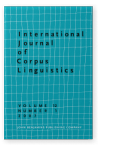Vol. 12:1 (2007) ► pp.83–105
Definite article usage before Last/Next Time in spoken and written American English
Unlike any other noun in English, time can combine with either Ø last/next or the last/next and maintain the same reference, e.g. (The) last time I saw her, she was still in grad school. Nontemporal nouns cannot combine with Ø last/next, while the references of temporal nouns change with the use of the before last/next, e.g. In 2001, he said he’d come back Ø next year (= in 2008) vs. In 2001, he said he’d come back the next year (= in 2002). Based on the analyses of tokens retrieved from both spoken and written corpora, this paper describes when and how often the combines with last/next time in American English. Defining temporal nouns as nouns that refer to specific periods or points of time, this paper also argues that, contrary to what other scholars have suggested (e.g. Larson 1985), time is not a temporal but quasi-temporal noun.
Cited by (4)
Cited by 4 other publications
This list is based on CrossRef data as of 4 july 2024. Please note that it may not be complete. Sources presented here have been supplied by the respective publishers. Any errors therein should be reported to them.
